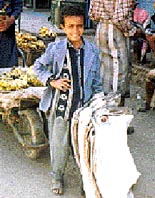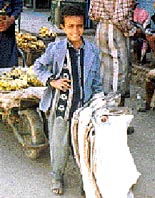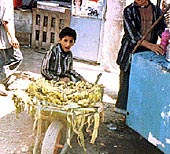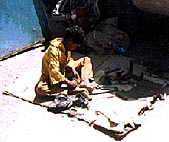
WORKING CHILDREN IN YEMEN: A GENERATION PRONE TO DISASTER [Archives:1999/46/Reportage]
November 15 1999
1st in a series
Mohammed Al-Qadhi,
Managing Editor
Introduction
Yemen will move into the third millennium with a heavy burden of problems and ordeals such as population explosion, poverty, unemployment, economic inflation, etc. In spite of the government’s adoption of the policy of economic reform, starting in 1995, the government is not able to avoid its negative impacts on account of the absence of accountability and transparency which could put an end to corruption, the major headache of Yemen. One of these detrimental impacts is the emergence of the phenomenon of a working children class in the Yemeni society. This phenomenon has been able to attract the attention of many people concerned who consider it a major problem deserving our full attention and concrete solutions. This is because it heralds an ominous future for a whole generation. In fact, it is a big problem to the economic and social development in Yemen, the main concern of the government.
Yemeni Children & Legislation


The amended Yemeni Constitution dictates in Article 30 “the state shall protect mothers and children, and shall sponsor the young.”
But the Yemeni Labor Law No. 5 of 1995 doesn’t define the minimum age under which children are prohibited to work. However, article 49 of the Yemeni Labor Law prohibits the employment of children without the consent of their parents, and requires that once consent is received, children are registered with the Labor Office so that their conditions can be monitored. It also prohibits children from being employed in remote areas and requires the employer to provide a healthy and safe work environment in accordance with conditions stipulated by the Ministry of Labor.

Article 145 imposes a fine ranging from YR 1,000 to YR 10,000 on employers in violation of the provisions for child workers. However, the provisions of the Labor Law are largely ignored in practice and the Labor Law itself suffers major shortcomings in terms of its ability to provide legal protection to working children.
Continued next week
——
[archive-e:46-v:1999-y:1999-d:1999-11-15-p:./1999/iss46/report.htm]


